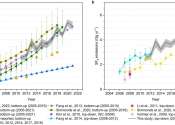Reducing CO₂ emissions by 20% with only a 2% economic loss
A "rapid and far-reaching change" is necessary to prevent catastrophic climate change, according to the Intergovernmental Panel on Climate Change (IPCC). "However, the transformation of the economy towards climate neutrality ...









